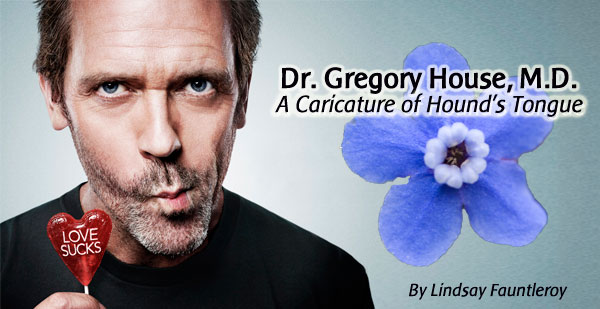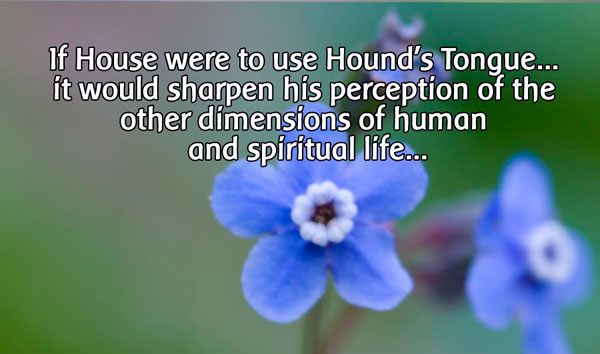|
Hound’s Tongue
Cynoglossum grande
Dr. Gregory House, MD is the star character of the hit FOX series, House . The show is centered around difficult medical cases, often bizarre medical emergencies, solved by the arrogant renowned diagnostician, and his team of expert physicians. A fictional drama, the story also follows the relationships and personal lives of its characters. Materialism is the ideology of which the world consists and can be perceived by the five senses; this construct underlies conventional biomedicine. This medical model aims to identify and predict the behavior of smaller and smaller aspects of matter. In assuming that all human illness has a physical causative factor, the Western biomedical model suggests that all illness can be cured if that specific molecular cause can be identified and treated (Gerber 9). This approach—weighted in matter, without the ability to imagine a dimension of human body that cannot be objectively measured—is the signature of Hound’s Tongue.
The biomedical model of health “lacks an appreciation for seemingly intangible things such as emotions, consciousness, and the energy and life force of soul and spirit” (Gerber 9). With its focus on disease , the patient experiencing the illness remains in the periphery. When we meet House in the pilot episode, he says that he does not bother meeting his patients because they confuse the data. While maintaining detachment, to diagnose his patients, House depends on lab reports and lists of symptoms observed by his team. House is a much sought-after doctor, largely because of his unconventional ways of curing disease. In spite of his arrogance and lack of social grace, patients seek him out when all of their other doctors have failed them. House sees his patients as no more than a series of predictable bio-chemical reactions. His approach often involves giving patients a medicine for a disease they have not been tested for, to “see how they’ll react” as a diagnostic strategy. “At least we’ll know if we are right,” House has been known to say about a prescribed medicine that carries the risk of allergic reaction, shock, or even death. House, an extreme Hound’s Tongue, has a “God complex” where he believes he is the be all and end all of his patients’ health. With no respect for the human values of honesty and integrity, House often outright lies to his patients to convince them to follow the course of treatment he recommends. House, an extreme Hound’s Tongue, has a “God complex” where he believes he is the be all and end all of his patients’ health. His inflated sense of self leads House to accept responsibility, and often guilt, out of proportion to his personal power. While it might seem as though his ego is the problem, his socially inacceptable behaviors most likely arrive from a profound fear that “this is all there is.” House’s lack of belief in a higher power—because it cannot be measured quantitatively—pervades throughout the show. He mocks his patients with biting sarcasm and cynicism when they express illogical hope or seek to draw on their spiritual resources to aid their healing process. Ironically, it is usually a serendipitous coincidence that leads House to solve his cases. A flash of inspiration or insight, triggered by a sign on his car or a story shared by a colleague, leads House to a diagnosis what was not found in the books. This is key about those in need of Hound’s Tongue; they are still subject to the benevolence of the spiritual world, but they are simply unable to honor, appreciate, or evoke this benevolence. While House is able to excel medically, the area of life that leaves him utterly confused is love. Love is an energy that defies materialism, intangible yet real. All his life, House has avoided love. He has no family to speak of. He is infamous for his inappropriate dealings with prostitutes and strippers, and House minimizes women to their body parts, serving to fill his sexual needs while he ignores his human need for love.
In Season 6, House begins a relationship with the Head of Medicine, Dr. Lisa Cutty. As their on-again-off-again relationship develops in the show, House is utterly baffled by love. Much of the show’s comic relief is centered around House’s literal interpretations of Cutty’s requests, while poignant moments center around House’s inability to read Cutty’s unspoken hurts, needs, and desires. Those in extreme need of Hound’s Tongue may be similarly baffled by the subtle nuances of human communication. Their “weightedness” in materialism may lead them to dry pedantic dispositions that can easily translate as social awkwardness. They may also, as does House, belabor their logical conclusions without a holistic perspective that allows them to see the various shades of gray or context of an argument. These two traits may inevitably lead to social isolation, in which the person may then develop logical, though untrue, reasons as to why they do not associate with those who avoid them, thus missing their opportunities for spiritual growth. Those in extreme need of Hound’s Tongue may be baffled by the subtle nuances of human communication. When Cutty ultimately ends the relationship in season 7, House is unable to comprehend the immense pain that he feels. Instead of dealing with the intangible emotions, he instead begins looking for physical manifestations of his pain. He takes a drug tested only on rats to alleviate the pain in his leg, and to numb the hurt in his heart. When the drug causes tumors to develop, House performs surgery on himself to remove the tumors, and arguably, the pain he cannot reach. Ultimately, the season ends with House driving a car through Cutty’s living room, as House is driven insane with painful emotions that he cannot name, touch, or cure. His depression is the direct result of his inability to perceive a higher power, or deeper meaning, to his pain. If House were to use Hound’s Tongue, it would not diminish his intellectual expertise or his skill as a diagnostician. Instead, it would lift his imagination to realize the higher meaning in his intellectual ideals; it would sharpen his perception of the other dimensions of human and spiritual life to affect healing on higher levels. Most importantly, it would allow him the faith and inspiration to discover the deeper meaning behind his patients, and his own, suffering. Unfortunately, it is not likely House would ever take flower essences without double-blind studies or other evidence to prove their efficacy. As may be the case clinically, those in need of Hound’s Tongue may only be driven to take flower essences as life experiences push them beyond what their logic and reason can explain or transform.
Lindsay Fauntleroy is the first
authorized teacher
for the
Flower Essence Society Practitioner Certification Program
in the U.S. Lindsay also teaches an Advanced Clinical Mentorship for experienced practitioners. Lindsay explains, “I believe that flower essences are that missing link for many body workers and wellness practitioners, and are a necessity if we seek to shift they way we think about the mind-body-spirit connection in healthcare. I had such a life-changing experience at
Terra Flora
, and I have so much respect for the level of research, integrity, and spirituality that Patricia and Richard bring to this work. It is such a huge honor to be able to work with FES in this way.”
|

To install this Web App in your iPhone/iPad press ![]() and then Add to Home Screen.
and then Add to Home Screen.




